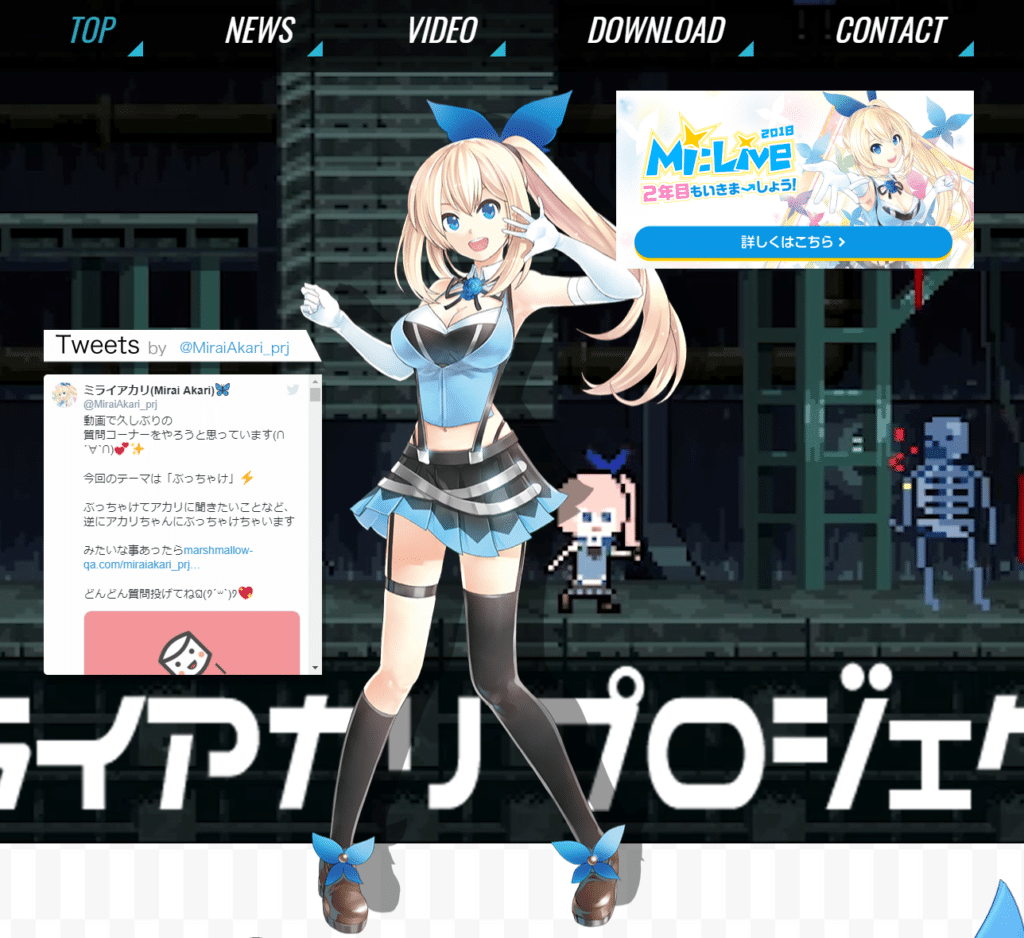Key Points of Corporate Contract Documents for Virtual YouTubers (VTubers)

Virtual YouTubers, or VTubers, are increasingly becoming entities that can secure so-called “projects” to advertise products or services, just like YouTubers, upon request from client companies.
The contract that should be concluded with client companies for such “projects” is generally what could be called a “Basic Service Contract”. This is a contract for being “commissioned” by the client to perform the “service” of advertising products or services. Moreover, it is cumbersome to conclude a contract for each video, so it is a contract regarding a “basic contract” that can be used for various projects.
In the case of Virtual YouTubers or VTubers, the following are necessary for such basic contracts:
- Clauses similar to those for talents and celebrities
- Clauses unique to YouTubers
- Clauses unique to Virtual YouTubers or VTubers
We will explain each of these in turn.
Provisions Similar to Those for Talents and Celebrities
Setting Up the Contracted Work
The contracts that talent agencies and similar organizations sign with client companies, which manage talents and celebrities, are typically composed of clauses like the following:
The client company entrusts the talent agency with promotional activities for products or services specified by the client company, to be carried out by talents specified by the client company.
Basic Contract and Individual Contracts
As mentioned above, these contracts are often concluded in the form of a “basic contract”. This is because it is cumbersome to conclude a contract for each individual product or service.
Article 1 (General Provisions)
The provisions of this contract apply to all individual contracts (hereinafter referred to as “individual contracts”) separately concluded for all or part of the work entrusted by the client company to the talent agency.
Article 2 (Individual Contracts)
An individual contract is a contract exchanged between the parties for each order of contracted work from the client company to the talent agency. An individual contract is established when the client company submits a document (or email) to the talent agency detailing the contracted work and its remuneration, and the talent agency expresses its intention to accept the contracted work in writing (or by email).
By concluding such a contract as a “basic contract”,
- The client company submits a document detailing the contracted work and its remuneration to the talent agency, and
- The talent agency expresses its intention to accept the contracted work in writing
An “individual contract” is established. In other words, contracts for individual products or services can be concluded not with a “contract”, but with
- Order forms and acceptance forms, or
- Emails stating the intention to place an order and emails stating the intention to accept the order
This is how it works.
Various Clauses Can Be Regulated in the Basic Contract
Furthermore, each individual contract established in this way is subject to the provisions of the basic contract, as stated in Article 1. For example, if the basic contract includes
Article 20 (Force Majeure)
If one party to this contract is delayed or unable to perform its obligations under this contract or an individual contract due to the circumstances specified in the following items, it shall not be held responsible.
(1) Natural disasters, fires, and explosions
(2) Infectious diseases
(3) Wars and civil unrest
(4) Revolutions and national divisions
(5) Orders and dispositions by public authorities
(6) Riots
(7) Other situations similar to the above
Then, even if you don’t set up a force majeure clause like the one above in each individual contract,
- There is a force majeure clause in the basic contract, and
- The provisions of the basic contract apply to the individual contracts
In this way, the force majeure clause applies to the individual contracts as well.
Unique Clauses for YouTubers
Differences in Commissioned Work
In the case of YouTubers, the tasks commissioned by client companies to YouTubers may include:
- Creating and publishing videos about products or services specified by the client company on the YouTube channel operated by the YouTuber (hereinafter referred to as “Video Creation and Publication”).
- Performing talent duties such as hosting at events specified by the client company.
- Other tasks agreed upon by both parties.
These are some examples of the tasks that may be commissioned.
Video Publication Guarantee Clause
There are also differences between general talents and YouTubers, such as:
- General Talents: The deliverables are under the control of the client company. For example, if a talent shoots a commercial for a client company, the video is used for the client company’s website or TV commercials.
- YouTubers: The deliverables are usually under the control of the YouTuber. In other words, the client company commissions a YouTuber with a large number of channel subscribers to create a promotional video about their product, and the video is published on the YouTuber’s channel.
Therefore, client companies are interested in whether the video uploaded by the YouTuber continues to be uploaded on the YouTuber’s channel for a certain period of time.
1. When a client company commissions the Video Creation and Publication, the publication guarantee period for the video is set to 6 months, during which the YouTuber, except for force majeure, shall continue to publish the video.
2. The YouTuber shall strive to continue publishing the video even after the period mentioned in the preceding paragraph, but shall not be held responsible for this.
This clause sets a certain period, such as 6 months, guarantees that the video will continue to be published within this range, but does not guarantee that the video will continue to be published beyond this. Without such a “certain period” reservation/limitation, a so-called channel BAN could result in contract violations for a large number of project videos, which is risky.
Force Majeure Clause in Preparation for Closure of YouTube Account
Also, YouTuber client projects are dependent on the web service YouTube. Although it is hard to imagine at this point, it would be desirable to add a force majeure clause so as not to violate the contract in case of YouTube’s closure. The so-called force majeure clause is a “clause to prevent contract violation by assuming unlikely events”. It is believed that force majeure clauses such as “natural disasters” were used without knowing whether they really worked, but they functioned extremely effectively at the time of the Great East Japan Earthquake. It is thought that a force majeure clause regarding the closure of YouTube should also be set, just in case.
Article 20 (Force Majeure)
When one party to this contract is delayed or unable to perform its obligations under this contract or individual contracts due to the circumstances specified in the following items, it shall not be held responsible.
(1) Suspension or termination of services by YouTube or other third-party services related to the commissioned work
(2) Suspension or termination of the YouTuber’s account or channel on the said service
(Omitted thereafter)
(2) is a force majeure clause in preparation for the so-called account BAN, which means that the closure of YouTube account. It would be reassuring if this is accepted, but it is likely to be more difficult to negotiate than (1).
Specific Clauses for Virtual YouTubers (VTubers)

Copyright-related Clauses
Videos created by Virtual YouTubers (VTubers) are a collection of various “works of authorship,” such as characters and images. Compared to traditional talents and YouTubers, copyright-related provisions become particularly important issues.
Virtual YouTubers (VTubers) shall guarantee that they will not infringe upon the copyright or other rights of third parties in the course of performing their commissioned tasks.
While such clauses are often required for talents and YouTubers, they are virtually “mandatory” for Virtual YouTubers (VTubers). If it is later discovered that the character of a Virtual YouTuber (VTuber) itself infringes on copyright, it could cause significant problems, such as damaging the image of the client company that commissioned the project. As a Virtual YouTuber (VTuber), it is essential to clearly guarantee that there is no copyright infringement.
Therefore, if a Virtual YouTuber (VTuber) is affiliated with an agency and the agency contracts with clients, the agency needs to pay attention to how to contract with the Virtual YouTuber (VTuber) and how to manage copyright-related matters.
Exemption Clauses for Misconduct by Voice Actors
While it is a debatable topic, we believe that Virtual YouTubers (VTubers) should also consider adding the following clause:
Unless specifically stipulated, all matters related to the natural persons involved in the Virtual YouTuber (VTuber), such as voice actors and character designers, shall not constitute a breach of contract by the Virtual YouTuber (VTuber).
Virtual YouTubers (VTubers) are accompanied not only by the channel operators but also by:
- Voice actors
- Character designers
However, compared to general anime and manga, it is not often that the specific individuals involved in the current Virtual YouTubers (VTubers) are highlighted. Also, compared to general anime and manga, it is often the case that so-called amateurs handle these roles for current Virtual YouTubers (VTubers).
Therefore, we believe that Virtual YouTubers (VTubers) should adopt the following approach:
- For example, a company that uses “Doraemon” in a TV commercial should be able to stop airing the commercial and claim “breach of contract” if the author or voice actor is involved in a scandal, even if there is no problem with the content of the commercial itself.
- Client companies that commission projects to Virtual YouTubers (VTubers) should not be able to claim “breach of contract” regarding scandals or misconduct related to the voice actor or character designer, as long as there is no problem with the content of the video itself.
We believe that Virtual YouTubers (VTubers) should adopt this approach.
Risks of Problematic Statements on Personal X(Twitter) Accounts of Voice Actors
In reality, the following scenario is entirely possible:
- The voice actor for a certain Virtual YouTuber (VTuber) is a general woman, but the information about who the voice actor is has not been disclosed.
- This woman has a personal X(Twitter) account and has made tweets that may not necessarily be socially acceptable.
- For some reason, information that “this woman is the voice actor for the Virtual YouTuber (VTuber)” started to circulate.
- The aforementioned tweets became controversial.
In such a case, if the client company claims “breach of contract” for the projects that the Virtual YouTuber (VTuber) has acquired, it could cause significant damage.
Summary: It’s Crucial to Craft Contracts Specifically Tailored to Individual Cases
As such, contracts related to securing projects for Virtual YouTubers or VTubers require clauses that have been used in existing systems for talents and celebrities, as well as clauses that are appropriate for the technology and culture of Virtual YouTubers. It can be said that legal experts who fully understand the technology and culture of Virtual YouTubers should design contracts according to specific cases.
Virtual YouTubers or VTubers are businesses with property value that can also be subject to business transfers and M&A. It is important to develop contracts for client projects as introduced in this article and to expand the business.
Category: Internet





















